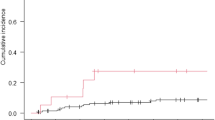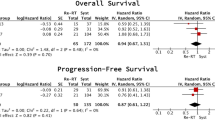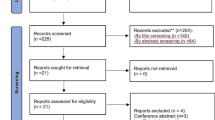Abstract
Patients with limited brain metastases are often candidates for stereotactic radiosurgery (SRS) or whole brain radiotherapy (WBRT). Among patients who receive SRS, the likelihood and timing of salvage WBRT or SRS remains unclear. We examined rates of salvage WBRT or SRS among 180 patients with 1–4 newly diagnosed brain metastases who received index SRS from 2008–2013. Competing risks multivariable analysis was used to examine factors associated with time to WBRT. Patients had non-small cell lung (53 %), melanoma (23 %), breast (10 %), renal (6 %), or other (8 %) cancers. Median age was 62 years. Patients received index SRS to 1 (60 %), 2 (21 %), 3 (13 %), or 4 (7 %) brain metastases. Median survival after SRS was 9.7 months (range, 0.3–67.6 months). No further brain-directed radiotherapy was delivered after index SRS in 55 % of patients. Twenty-seven percent of patients ever received salvage WBRT, and 30 % ever received salvage SRS; 12 % of patients received both salvage WBRT and salvage SRS. Median time to salvage WBRT or salvage SRS were 5.6 and 6.1 months, respectively. Age ≤60 years (adjusted hazard ratio [AHR] = 2.80; 95 % CI 1.05–7.51; P = 0.04) and controlled/absent extracranial disease (AHR = 6.76; 95 % CI 1.60–28.7; P = 0.01) were associated with shorter time to salvage WBRT. Isolated brain progression caused death in only 11 % of decedents. In summary, most patients with 1–4 brain metastases receiving SRS never require salvage WBRT or SRS, and the remainder do not require salvage treatment for a median of 6 months.

Similar content being viewed by others
References
Klos KJ, O’Neill BP (2004) Brain metastases. Neurologist 10:31–46
Langer CJ, Mehta MP (2005) Current management of brain metastases, with a focus on systemic options. J Clin Oncol 23:6207–6219
Fox BD, Cheung VJ, Patel AJ et al (2011) Epidemiology of metastatic brain tumors. Neurosurg Clin N Am 22:1–6
Posner J (1992) Management of brain metastases. Revue Neurologique (Paris) 148:477–487
Schouten LJ, Rutten J, Huveneers HA et al (2002) Incidence of brain metastases in a cohort of patients with carcinoma of the breast, colon, kidney, lung and melanoma. Cancer 94:2698–2705
Aoyama H, Shirato H, Tago M et al (2006) Stereotactic radiosurgery plus whole-brain radiation therapy vs. stereotactic radiosurgery alone for treatment of brain metastases: a randomized controlled trial. JAMA 295:2483–2491
Kocher M, Soffietti R, Abacioglu U et al (2011) Adjuvant whole-brain radiotherapy versus observation after radiosurgery or surgical resection of one to three cerebral metastases: results of the EORTC 22952-26001 study. J Clin Oncol 29:134–141
Chang EL, Wefel JS, Hess KR et al (2009) Neurocognition in patients with brain metastases treated with radiosurgery or radiosurgery plus whole-brain irradiation: a randomised controlled trial. Lancet Oncol 10:1037–1044
Halasz LM, Weeks JC, Neville BA et al (2013) Use of stereotactic radiosurgery for brain metastases from non-small cell lung cancer in the United States. Int J Radiat Oncol Biol Phys 85:e109–116
Andrews DW, Scott CB, Sperduto PW et al (2004) Whole brain radiation therapy with or without stereotactic radiosurgery boost for patients with one to three brain metastases: phase III results of the RTOG 9508 randomised trial. Lancet 363:1665–1672
Sperduto PW, Shanley R, Luo X et al (2014) Secondary analysis of RTOG 9508, a phase 3 randomized trial of whole-brain radiation therapy versus WBRT plus stereotactic radiosurgery in patients with 1–3 brain metastases; poststratified by the graded prognostic assessment (GPA). Int J Radiat Oncol Biol Phys 90:526–531
Arvold ND, Catalano PJ (2015) Local therapies for brain metastases, competing risks, and overall survival. Int J Radiat Oncol Biol Phys 91:718–720
DeAngelis LM, Delattre JY, Posner JB (1989) Radiation-induced dementia in patients cured of brain metastases. Neurology 39:789–796
Gondi V, Paulus R, Bruner DW et al (2013) Decline in tested and self-reported cognitive functioning after prophylactic cranial irradiation for lung cancer: pooled secondary analysis of Radiation Therapy Oncology Group randomized trials 0212 and 0214. Int J Radiat Oncol Biol Phys 86:656–664
Soffietti R, Kocher M, Abacioglu UM et al (2013) A European Organisation for Research and Treatment of Cancer phase III trial of adjuvant whole-brain radiotherapy versus observation in patients with one to three brain metastases from solid tumors after surgical resection or radiosurgery: quality-of-life results. J Clin Oncol 31:65–72
Sahgal A, Aoyama H, Kocher M et al (2015) Phase III trials of stereotactic radiosurgery with or without whole brain radiotherapy for 1–4 brain metastases: individual patient data meta-analysis. Int J Radiat Oncol Biol Phys 91:710–717
Lester SC, Taksler GB, Kuremsky JG et al (2014) Clinical and economic outcomes of patients with brain metastases based on symptoms: an argument for routine brain screening of those treated with upfront radiosurgery. Cancer 120:433–441
Shaw E, Scott C, Souhami L et al (2000) Single dose radiosurgical treatment of recurrent previously irradiated primary brain tumors and brain metastases: final report of RTOG protocol 90-05. Int J Radiat Oncol Biol Phys 47:291–298
Minniti G, Clarke E, Lanzetta G et al (2011) Stereotactic radiosurgery for brain metastases: analysis of outcome and risk of brain radionecrosis. Radiat Oncol 6:48
Kondziolka D, Parry PV, Lunsford LD et al (2014) The accuracy of predicting survival in individual patients with cancer. J Neurosurg 120:24–30
Yamamoto M, Serizawa T, Shuto T et al (2014) Stereotactic radiosurgery for patients with multiple brain metastases (JLGK0901): a multi-institutional prospective observational study. Lancet Oncol 15:387–395
Ayala-Peacock DN, Peiffer AM, Lucas JT et al (2014) A nomogram for predicting distant brain failure in patients treated with gamma knife stereotactic radiosurgery without whole brain radiotherapy. Neuro Oncol 16:1283–1288
Mehta MP, Tsao MN, Whelan TJ et al (2005) The American Society for Therapeutic Radiology and Oncology (ASTRO) evidence-based review of the role of radiosurgery for brain metastases. Int J Radiat Oncol Biol Phys 63:37–46
National Comprehensive Cancer Network: The NCCN Central Nervous System Cancers Clinical Practice Guidelines in Oncology, Version 2.2014. http://www.nccn.org. Accessed 16 Mar 2015
Rodrigues G, Warner A, Zindler JD, Slotman BJ, Lagerwaard FJ (2014) A clinical nomogram and recursive partitioning analysis to determine the risk of regional failure after radiosurgery alone for brain metastases. Radiother Oncol 111:52–58
Sawrie SM, Guthrie BL, Spencer SA et al (2008) Predictors of distant brain recurrence for patients with newly diagnosed brain metastases treated with stereotactic radiosurgery alone. Int J Radiat Oncol Biol Phys 70:181–186
Lorenzoni J, Devriendt D, Massager N et al (2004) Radiosurgery for treatment of brain metastases: estimation of patient eligibility using three stratification systems. Int J Radiat Oncol Biol Phys 60:218–224
Kress MA, Ramakrishna N, Makgoeng SB et al (2012) Physician self-reported treatment of brain metastases according to patients’ clinical and demographic factors and physician practice setting. Radiat Oncol 7:188
Aupérin A, Arriagada R, Pignon JP et al (1999) Prophylactic cranial irradiation for patients with small-cell lung cancer in complete remission. Prophylactic Cranial Irradiation Overview Collaborative Group. N Engl J Med 341:476–484
Kim DH, Schultheiss TE, Radany EH et al (2013) Clinical outcomes of patients treated with a second course of stereotactic radiosurgery for locally or regionally recurrent brain metastases after prior stereotactic radiosurgery. J Neurooncol 115:37–43
Sneed PK, Lamborn KR, Forstner JM et al (1999) Radiosurgery for brain metastases: is whole brain radiotherapy necessary? Int J Radiat Oncol Biol Phys 43:549–558
Author information
Authors and Affiliations
Corresponding author
Ethics declarations
Conflict of interest
None.
Rights and permissions
About this article
Cite this article
Liu, Y., Alexander, B.M., Chen, YH. et al. Salvage whole brain radiotherapy or stereotactic radiosurgery after initial stereotactic radiosurgery for 1–4 brain metastases. J Neurooncol 124, 429–437 (2015). https://doi.org/10.1007/s11060-015-1855-5
Received:
Accepted:
Published:
Issue Date:
DOI: https://doi.org/10.1007/s11060-015-1855-5




